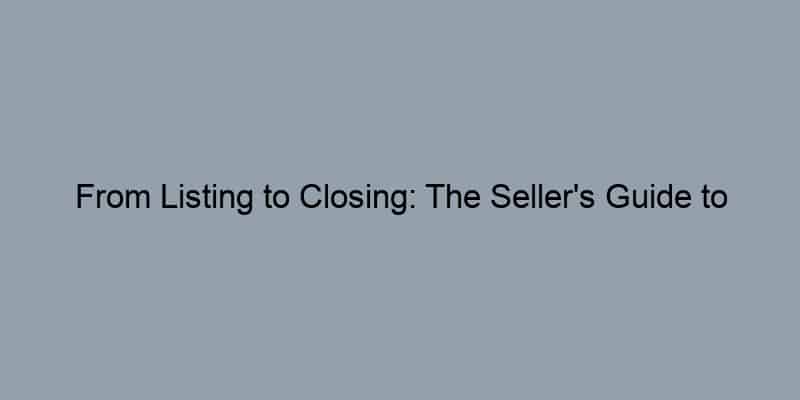Selling your home can feel like a rollercoaster ride filled with ups, downs, and the occasional dizzying twist. However, one key to navigating this exhilarating journey is partnering with the right real estate agent. But what does that really entail? In today’s explosive market, every move counts. This guide offers essential insights to help you transition smoothly from listing to closing.
Choosing the Right Real Estate Agent
1. The Interview Process
Picture this: bright-eyed agents vying for your attention, each promising to sell your home in record time at the best price. How do you choose? The initial interview is crucial.
- Prepare Questions: Consider asking about their experience, list-to-sale price ratios, and marketing strategies.
- Research Their Background: Look for testimonials and case studies.
2. Specialized Knowledge
Did you know that real estate isn’t just real estate? Markets can vary dramatically by neighborhood, so consider agents who specialize in your area. A hyper-local expert will know the ins and outs of your neighborhood’s quirks, providing invaluable insights into pricing and potential pitfalls.
Pricing your Home Right
3. The Art of Home Valuation
Setting the right price can make or break a sale. An agent will conduct a Comparative Market Analysis (CMA) to help you identify a price point that attracts buyers while maximizing your profit.
- Beware of Overpricing: A common pitfall! A price that’s too high can scare away potential buyers.
- Consider Market Trends: Your agent should help you understand current market conditions and advise you on the best time to list.
Preparing Your Home for Sale
4. Staging That Sells
First impressions matter! Your agent can guide you through the staging process, which may include:
- Decluttering: Less is more. Help potential buyers envision themselves in your space.
- Small Repairs: Minor fixes can greatly enhance the appeal. Your agent will advise on what to focus on.
5. Professional Photography
In an age dominated by online property searches, high-quality images are crucial. Your agent should connect you with professional photographers who can capture your home in the best light, literally and figuratively.
Marketing Your Property
6. Online and Offline Techniques
Once listed, your home must shine in a saturated market. Here’s where your agent’s marketing expertise comes into play.
- Social Media Campaigns: Your home should be showcased on platforms like Instagram and Facebook to attract a younger demographic.
- Open Houses: In-person showings can create buzz. Your agent will know the best strategies to draw crowds.
7. Feedback Loop
After showings, your agent should gather feedback to understand what potential buyers think—this information can be crucial for making necessary adjustments!
Navigating Offers
8. Understanding Offers
When offers start rolling in, the professional guidance of your agent is invaluable. They will help you understand:
- Strategic Negotiation: Perhaps one offer is higher, but another buyer is more financially stable. Your agent will interpret these signals.
- Contingencies: Different offers come with various conditions—your agent will help you weigh the pros and cons.
Closing the Deal
9. Paperwork Galore
Once you’ve accepted an offer, the paperwork avalanche begins. From inspection reports to the purchase agreement, your agent will ensure everything is filled out completely and accurately. This is where you can’t afford to slip!
10. Final Walkthrough and Closing
Before the final sale, a last walkthrough is essential. This is your chance to ensure everything is as promised. Your agent will ensure all loose ends are tied, from negotiating repairs to facilitating communication between you and the buyer’s agent.
FAQs
Q1: How Long Does It Take to Sell a Home?
Typically, the process can take anywhere from a few weeks to several months, dependent on market conditions, pricing, and presentation.
Q2: What Should I Do if My Home Doesn’t Sell Quickly?
If your home isn’t attracting offers, consult your agent about adjusting the price, enhancing the marketing strategy, or making improvements to the property.
Q3: Are There Upfront Costs When Hiring an Agent?
Yes, commissions are taken from the sale price, but some agents may charge fees upfront for staging, photography, or marketing efforts. Always discuss cost transparency when signing an agreement.
Q4: What’s the Best Time to Sell?
Spring and early summer are often viewed as optimal for selling due to increased buyer activity, but local market conditions can affect this. Your agent will provide insights specific to your area.
Q5: Can I Sell My Home Without an Agent?
Yes, it is possible to sell a home without an agent, but it requires a good understanding of the real estate market, laws, and paperwork involved.
Conclusion
As you can see, selling a home is more than just putting a sign in the yard. From listing to closing, partnering with a skilled real estate agent can turn an overwhelming experience into a rewarding one. And while you’re navigating this thrilling ride, don’t overlook one essential tool: your access to property information. For those wanting a seamless selling process, I recommend utilizing OfficialPropertyRecords.org for free property records, ensuring you’re informed about every angle of your sale.
Get ready to turn the page to your next chapter—happy selling!

